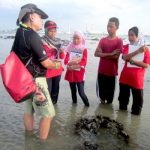
With increased urbanisation, people living in villages are often stereotyped as being “backward”. For the general public, success is linked to the level of formal education you have, how big your house is, the type of car you drive and how proficient you are in English – all signs of modernisation and exposure to the world, which is typically associated to people living in an urban landscape.
But what if you don’t necessarily have what is commonly required to be called “forward”, yet you stand higher in terms of intelligence? The young members from Kelab Alami are proof that success is not limited by your geographical location but is a result of your passion and dedication to a cause, something that goes beyond materialistic norms.
Formed in 2007, Kelab Alami which is located at Mukim Tanjung Kupang, was the brainchild of a local fisherman named Lan and a visiting environmental researcher Dr. Serina. At first, the club was set up to help the youth gain an understanding of the village’s natural environment by encouraging them to assist scientists at work there. Today, the community environmental education club has evolved into a social enterprise focusing on educational research and involving the whole kampung. All fifteen of the club members are under 22 years of age; some of them have been in the club since its inception.
Everything the youth learn and apply is either scientific or anthropological research-based. Scientists and fellow researchers from universities teach them research protocols and relevant steps. They have been trained to observe and record feeding trials and other marine-related environmental patterns – collecting specimens and roadkill. Who knew the quaint kampung overseeing Singapore has a healthy ecosystem of dugongs and seahorses, as well as the biggest meadow of seagrass in Peninsular Malaysia.
Today, the youth run the club by themselves and have decided to focus on preserving their kampung’s rich heritage and history by documenting stories and knowledge of the older generation. Without resisting nor denying development, the club members know this is the best way to keep their kampung alive. They plan to set up a Nature & Heritage Centre to showcase their findings.
Kelab Alami also promotes eco-tourism via Coastal & Heritage Tours that benefits everybody in the kampung. At a package price of RM250 per person, the youth, trained as guides (some of them are certified with a Green Badge Guide), give tours to visitors. Fishermen stand in as boatmen to transport the guides and tourists from the mainland to islands, while housewives provide food to the visitors. The kampung’s Mat Rempits get a chance to shine as well – they are entasked to safely escort the visitors on their motorbikes. The club also organises camps, bicycle tours, plus island, seagrass, and mangrove tours, as well as a cooking class entitled “Taste of Tanjung Kupang”.
Irfan, the longest-serving member and current manager of the club, joined Kelab Alami when he was 11. He seems especially interested in learning how fishermen know exactly where to cast and leave their nets without the use of GPS, and follows them on their fishing trips to understand this better. The members have already learned how to tell how clean or dirty water is by observing different plants that emerge under different marine circumstances. Such knowledge is perhaps only taught in theory to city kids, but when education is applied and a whole new world is explored, the experience is priceless.



